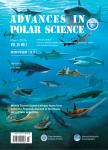Assessment of trace metals in droppings of Adélie penguins(Pygoscelis adeliae) from different locations of the Antarctic Peninsula area
Assessment of trace metals in droppings of Adélie penguins(Pygoscelis adeliae) from different locations of the Antarctic Peninsula area作者机构:Facultad de Ciencias Veterinarias Universidad de Concepción Facultad de Ciencias Ambientales Universidad de Concepción
出 版 物:《Advances in Polar Science》 (极地科学进展(英文版))
年 卷 期:2015年第26卷第1期
页 面:1-7页
学科分类:083001[工学-环境科学] 0830[工学-环境科学与工程(可授工学、理学、农学学位)] 07[理学] 08[工学] 0713[理学-生态学]
基 金:supported by project INACH T 1809 project FONDECYT 1140466 project INACH RG 09-14
主 题:heavy metals seabirds penguins excreta guano marine pollution Antarctica
摘 要:In recent decades, polar regions of the planet have witnessed an increase in human presence. Antarctica is considered one of the most pristine regions of the world, but it could be affected by pollution owing to anthropogenic activities, particularly in the Antarctic Peninsula. Human presence can increase the levels of some trace metals in Antarctic environments, an issue that needs to be evaluated. To acquire data of trace metal contamination in the Antarctic Peninsula region, concentrations (dry weight) of Cd, Pb, As, Cu, Hg and Zn in fresh excrement of Ad61ie penguins were determined by atomic absorption spectrophotometry. During the 2012/2013 austral summer, samples were collected from four important nesting sites on the Antarctic Peninsula: Arctowski Base, Kopaitic Island (both sites in the northern Antarctic Peninsula), Yalour Island and Avian Island (both sites in the southern Antarctic Peninsula). Data showed that Ad61ie penguin excreta had significantly higher levels (***~) of As, Cd, Hg, Pb and Cu at Arctowski Base and Kopaitic Island, both sites that have major anthropogenic activities that probably contributed to increased metal levels. The levels of trace metals in Ad61ie penguins were similar to those reported in excreta of Antarctic species in previous studies, and lower than those in excreta of other Antarctic animals. Data suggest that metals ingested by these penguin species that feed in the sea, end up in terrestrial ecosystems.



